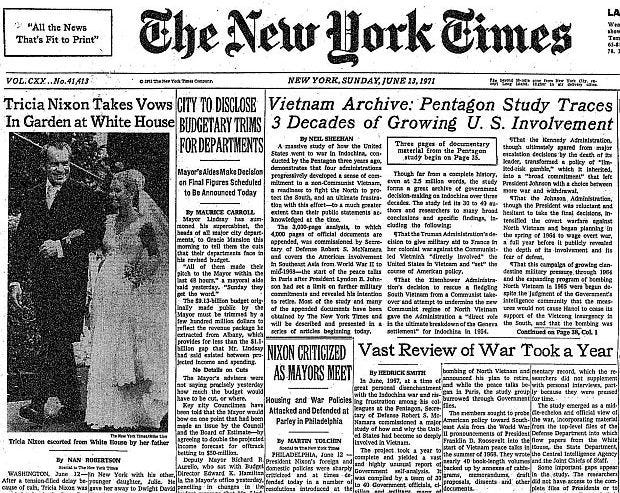In June of 1971, the New York Times began to publish articles about the information uncovered in these papers. The US Department of Justice obtained a temporary restraining order against the revealing of this classified information, but the Supreme Court, in a 6-3 decision, freed the newspaper to continue publishing the material. The portions revealed to the public demonstrated that Presidents Truman, Eisenhower, Kennedy, and Lyndon B. Johnson had all been dishonest towards the public regarding the role of America in Vietnam and the degree to which it would extend.
As one would imagine, the Pentagon Papers caused nation-wide and international controversy over the legal and moral issues with Vietnam and the US actions taken. Many dissenters of the war had their suspicions confirmed. However, despite the newfound information at hand about these previous presidents, arguably the biggest impact was made on President Nixon, even though none of his policies were covered in the in-depth study. Nixon was understandably concerned about the situation, because it was a threat to the secret diplomacy he had going on at the time. People were beginning to become more suspicious of Nixon as well due to the revelations made in the papers, and he was worried that would affect his re-election that was coming up. Overall, Nixon and his administration were embarrassed, and Nixon's worst fears about the press and media were confirmed.
After the Supreme Court decision, Nixon's paranoia led him to try and have Ellsberg and one of his accomplices indicted of criminal charges. However, these charges were dismissed once it came to light that Nixon also had Ellsberg's psychiatrist office burglarized by a secret White House team, known as "The Plumbers", in an attempt to find discrediting information about him. This team was also involved in the Watergate break-in scandal that would lead to Nixon's resignation later on.
The Pentagon Papers were released in book form in 1971, but did not feature the complete documents. In 2011, the previously classified portions were released, and the public could view the study in its entirety.

The Pentagon Papers shocked the world, making front-page headlines.
Sources:
https://www.history.com/topics/vietnam-war/pentagon-papers
https://www.britannica.com/topic/Pentagon-Papers
I think it is interesting to read about the Pentagon Papers because they are not as widely talked about as the actual Watergate scandal, but still an important controversy of the era. Daniel Ellsberg is certainly an interesting character because at the time, he was considered by the government to be a traitor and charged with theft, conspiracy, and espionage. However, now many people see him has an unlikely hero who stood up for his morals and uncovered government deception. He does not regret his decision to leak the papers, as he sees them as necessary "evidence of a quarter-century of aggression, broken treaties, deceptions, stolen elections, lies and murder" that the public deserved to know about.
ReplyDeletehttps://www.biography.com/activist/daniel-ellsberg
This blog did an excellent job of describing the papers. One thing I looked into more was "The Plumbers". One shocking thing I learned was that, in an interview with CNN in 1999, Ellsberg revealed that after his trial, the Watergate prosecutor William Merrill actually told him that "The Plumbers" earlier arranged for 12 Cuban Americans who had worked for the CIA to "incapacitate Daniel Ellsburg totally" during a rally he was speaking at. The goal was either to kill him or make it physically impossible for him to be placed in a hospital for a while, making it impossible for him to speak. Luckily, the plan did not come to fruition as the timing for the plan was off. However, this act shows the extent Nixon and his administration were willing to go through to try to protect their reputation.
ReplyDeleteSource:
https://web.archive.org/web/20081219071852/http://www.cnn.com/SPECIALS/cold.war/guides/debate/chats/ellsberg/